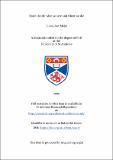Brain death : what we are and when we die
Abstract
When does a human being cease to exist? For millennia, the answer to this question had remained largely unchanged: death had been diagnosed when heartbeat and breathing were permanently absent. Only comparatively recently, in the 1950s, rapid developments in intensive-care medicine called into question this widely accepted criterion. What had previously been deemed a permanent cessation of vital functions suddenly became reversible. A new criterion of death was needed. It was suggested that the destruction of the brain could indicate the death of the organism in the presence of external life support. Soon the so-called brain death became the new worldwide standard. In recent years, however, doubts about this neurological criterion have been growing. Is brain death really our death? This is the question that this thesis seeks to answer. To this end, we shall connect the medical debate about the definition of death to the philosophical debate about personal identity. While we will find that the destruction of its brain does in fact not correspond to an organism’s death, we shall also ask whether the assumption that we are essentially organisms is correct. May brain death be the ceasing to exist of a different entity? Substituting clinical case reports and considerations about human physiology for the use of thought experiments, the thesis takes a novel and philosophically unconventional approach to the problem of what we essentially are. We shall analyse various pathological conditions and their respective effects on the bodily and mental characteristics of our existence. We will conclude that brain death is indeed our death – but for reasons entirely different from those cited in the original justification of this criterion.
Type
Thesis, PhD Doctor of Philosophy
Rights
Embargo Reason: Embargo period has ended, thesis made available in accordance with University regulations
Collections
Description of related resources
Meier, L. J. (2023): Memories without Survival: Personal Identity and the Ascending Reticular Activating System. The Journal of Medicine and Philosophy 48 (5): 478-491. DOI: 10.1093/jmp/jhad028Meier, L. J. (2022): The Demise of Brain Death. The British Journal for the Philosophy of Science 73 (2): 487-508. DOI: 10.1093/bjps/axz045
Meier, L. J. (2022): Can Thought Experiments Solve Problems of Personal Identity? Synthese 200 (221): 1-23. DOI: 10.1007/s11229-022-03637-7
Meier, L. J. (2020): Are the Irreversibly Comatose Still Here? The Destruction of Brains and the Persistence of Persons. Journal of Medical Ethics 46 (2): 99-103. DOI: 10.1136/medethics-2019-105618
Items in the St Andrews Research Repository are protected by copyright, with all rights reserved, unless otherwise indicated.

